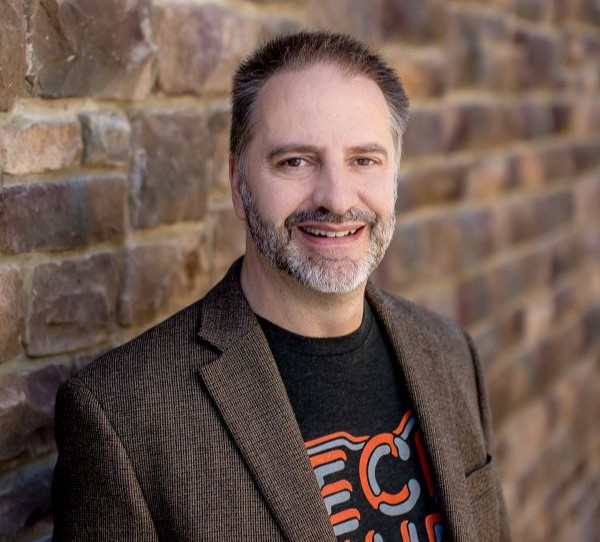Artificial intelligence has moved from an emerging concept to an everyday reality. Its pace is unprecedented, its influence far-reaching, and its implications impossible to ignore. This urgency shaped The Great Workforce Reboot: AI Edition, a virtual conversation moderated by Vicki Thompson, Senior Director of Workforce Growth Partnerships at TPMA.
Vicki set the tone immediately, inviting attendees to consider what AI means for classrooms, employers, and communities:
“Think about how these trends may influence your institution… your workforce concerns, potential risks, and the transformative possibilities that AI brings.”
What followed was a grounded, forward-looking discussion featuring:
- Ting Gootee, President & CEO, TechPoint
- Oliver Belanger, COO, Citizen AI
- Rob Buchwald, CEO, Akron Innovations & AI Catalyst Institute
- Sara Tracey, Vice President of Workforce & Education, TPMA
Together, they delivered a candid look at how AI is reshaping talent, industry, and opportunity.

AI’s Acceleration Is Unlike Anything Before
Insights from Ting Gootee, TechPoint
Ting opened with context that clarified the accelerating tempo of technological change:
“The PC era took about 20 years to make mainstream… the internet era took about 12 years… and the mobile era took about 6 years. The AI era we’re in today is likely to last about 3 to 5 years.”
AI is not simply the next wave. It is the fastest one yet.
Ting also highlighted what this means in practical terms for states like Indiana:
“We are seeing a lot in the AI space… putting a lot of focus around talent, innovation, entrepreneurship, and community building.”
Her message was clear: the speed of AI adoption requires collective readiness and accelerated learning.

AI-Native Companies Are Redefining the Market
Insights from Oliver Belanger, Citizen AI
Oliver brought a practitioner’s perspective from within the AI innovation space, contrasting traditional businesses with those built from the ground up on AI.
“The only companies hitting $100 million in revenue in one to two years… are the AI-native companies.”
He also highlighted what many leaders underestimate: how dramatically AI shifts skill dynamics:
“AI democratizes technical skill and knowledge… An entry-level employee becomes capable of producing the same output as a professional of 20 years.”
This insight serves as a warning that skills advantage is no longer defined by years of experience, but by access and adaptability.
Oliver also offered a memorable reflection on the long-term importance of this moment:
“AI skills are an evolution of internet and web skills, which are an evolution of digital and PC skills… if you don’t know the previous foundation, you will struggle… really struggle with the next one.”

Your AI Talent Is Already Inside Your Organization
Insights from Rob Buchwald, Akron Innovations & AI Catalyst Institute
Rob’s perspective was practical and encouraging. Companies often assume they must hire new experts to implement AI, but Rob pushed back firmly:
“The skills every company needs in the AI era already exist within the company.”
His advice to leaders was simple, immediate, and echoed by the audience chat:
“Talk to your team about AI. The time for wait-and-see is over.”
Rob reminded attendees that employees are already learning AI tools at home—often faster than their workplaces are adapting.
He also offered historical context that underscored the magnitude of this moment:
“The last time we’ve seen a workforce reboot this scale was the PC revolution… AI is the first technology since then that demands a universal skills upgrade.”
The workplace is shifting again, and this time, everyone must change with it.

AI Is Changing Apprenticeships and Curriculum — Not Replacing Them
Insights from Sara Tracey, TPMA
Sara linked AI’s rise directly to the evolution of education and workforce programs. Her message was grounded and practical:
“We’re going to see new programs for data scientists and prompt engineers… and existing programs will have to update their curriculum.”
She emphasized that AI can support program design, but cannot replace the human elements:
“AI can create standards for us… but we still need someone to humanize that and ensure industry validation.”
Sara’s focus on equity was a crucial reminder:
“We still need to bring training into classrooms or libraries… and not assume that learners have broadband at home.”
AI expands opportunity, but only if systems expand access.
The Policy Landscape: Protecting People Without Halting Progress
Oliver also addressed the growing focus on AI regulation across the country:
“A lot of legislation now focuses on protecting consumers from AIs that pretend to be something they aren’t.”
Ting added that while policy and compliance take time, adoption cannot:
“Because of the fast pace of change… learning how to use the tool is critical, regardless of age or sector.”
Final Words From the Panel
Each leader closed with a word of advice:
Oliver Belanger:
“AI will itself be a foundation for a new technology and a new set of skills.”
Rob Buchwald:
“Those learning AI skills are bringing their own tools to the workplace because their workplace isn’t offering them.”
Ting Gootee:
“The fear factor is certainly out there… that’s more the reason we must accelerate our collective learning.”
The Bottom Line
The AI era is here and moving faster than any technology wave in history. But the message from the panel was both realistic and hopeful:
- We can prepare.
- We have the talent.
- We can adapt curriculum and training.
- We can create pathways that include everyone.
- We can build the guardrails we need.
Most importantly, we don’t need to do this alone.
The future of AI will be shaped through collaboration between educators, employers, workforce boards, innovators, and communities. This webinar made one thing clear — Indiana has the expertise, partnerships, and shared commitment to embrace this workforce reboot together.
Key Takeaways from the Webinar
• AI is accelerating faster than any previous technology wave.
Ting Gootee emphasized that organizations must prepare now, as the AI era will move even faster than the adoption of mobile, the internet, and PCs.
• Your workforce already holds the potential you need.
Rob Buchwald reminded us that many AI-ready skills exist inside organizations today—employees need support to activate them.
• AI democratizes skill and levels the playing field.
Oliver Belanger shared that AI can help entry-level workers perform at a higher level, reshaping how we think about experience and capability.
• Programs and curriculum must evolve.
Sara Tracey highlighted the need for new pathways, updated training, and human-guided approaches that keep learning aligned with employer needs.
• Collaboration is essential.
Every speaker emphasized that industry, education, and workforce leaders must learn together and move forward collectively.
Want to hear more from our panel? Watch the full session here!
